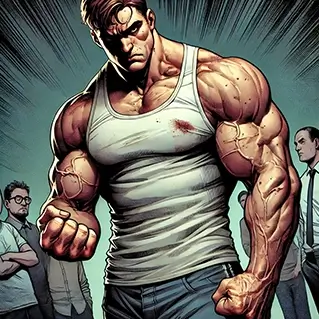
The Strength of Masculinity: Why Strong Men Are Essential in Today’s Society
The Misconception of Toxic Masculinity
The term “toxic masculinity” has become a buzzword in modern discussions, often used to vilify men as inherently aggressive, violent, or controlling. However, this oversimplified and misguided narrative fails to distinguish between genuine masculinity and behaviors stemming from insecurity or immaturity. True masculinity is not about dominance or cruelty, but about using strength to serve, protect, and build a better society. In reality, it is men who lack self-confidence and emotional maturity who are most likely to lash out in harmful ways, not those who embody true masculine virtues.

What It Really Means to Be Masculine

At its core, masculinity is about the ability, responsibility, and power to protect, lead, and provide. A truly masculine man is not someone who flaunts his physical power to intimidate or harm others but someone who understands his strength and uses it responsibly. One of the hallmarks of masculine strength is restraint — the ability to control impulses, especially when one has the power to act otherwise. A weak man cannot be gentle, but a strong man can choose to be gentle” – a truly strong person has the power and self-control to choose to be gentle, even when faced with challenging situations. A man who has the capacity to react with violence but exercises self-control is a true protector, while one who cannot protect is simply weak, not restrained.
Historical and Modern Masculinity: The Importance of Strong Men
Throughout history, strong men have been the backbone of societies. From warriors defending their tribes to builders of civilizations, masculine strength has been key to societal survival and progress. In today’s world, the need for strong men is just as great. We live in an era of relative comfort, but good times make weak men. When hard times return, as they inevitably do, it will be the strong — those with the courage, discipline, and wisdom to lead and protect — who will carry society through the challenges. This cyclical nature of history proves the ongoing importance of masculinity in modern times.
Masculine Men Benefit Society
Masculine men play a critical role in ensuring stability and peace. They provide for their families, mentor younger generations, and create safe environments where communities can thrive. This is evident in the protection of others, not through aggression but through the quiet, unspoken strength that people know they can rely on in times of need. Emasculating men, as seen in certain social movements today, weakens the fabric of society. When men are encouraged to be passive, or worse, ashamed of their masculinity, society loses protectors, providers, and strong leaders.
The Societal Shame of Traditional Masculinity
In recent years, society has shifted toward shaming men for embracing traditional masculinity. Men are often portrayed as being inherently dangerous, toxic, or problematic simply for embodying masculine traits. Messages from media, educational institutions, and even public policy have reinforced this narrative, encouraging men to be more passive and relinquish what makes them inherently male. This phenomenon can have damaging effects not only on men themselves but also on the family unit and society as a whole.
Many men, feeling pressure to conform to these modern ideals, find themselves becoming emotionally stunted and physically weaker. These men are disconnected from their natural instincts to protect, lead, and serve. Instead of feeling empowered, they are shamed into passivity. The push to emasculate men has led to a generation of men who are unsure of their role in society, which has resulted in increasing levels of anxiety, depression, and identity crises. Men who are denied the space to be men are more likely to suffer mentally, emotionally, and even physically.

The Role of Masculine Men in a Diverse Society
Contrary to popular misconceptions, masculine men who follow traditional religious values are not domineering or oppressive. According to Ephesians 5:25, “Husbands, love your wives, just as Christ loved the church and gave himself up for her.” This paints a picture of sacrificial love, where a man’s strength is used to serve and uplift those he loves, not to control or diminish them. In Christian teachings, a masculine man is expected to protect and provide for his family with selfless love, embodying the balance of strength and compassion.
Masculinity and Religious Values
Masculine men are often unfairly depicted as being opposed to modern movements or diversity. However, the truth is that a masculine man is confident and strong enough to protect and help all people, regardless of their background or beliefs. Whether someone is part of the LGBTQ+ community or comes from a different race or culture, true masculinity is about standing up for justice and peace. Masculine men use their strength to create environments where everyone can thrive, showing that the protector role knows no boundaries.
Why We Need Masculine Men Today
As society faces new challenges, from economic instability to global conflict, the need for masculine men is more apparent than ever. Strong men create strong families, protect the vulnerable, and lead with honor. In times of crisis, it is not passive or weak men who will rise to the challenge, but those who have cultivated the strength — physical, emotional, and moral — to act decisively when needed. The world needs men who are proud of their masculinity, not ashamed of it.
The Impact on Families and Society
The consequences of weakening men extend beyond individuals. A family thrives when men and women embrace their natural strengths, complementing each other in their roles as providers, protectors, nurturers, and caregivers. When men are shamed into abandoning their masculinity, it disrupts the balance in families. Fathers who lack a strong, masculine presence often struggle to set boundaries and provide the leadership their children need. Children, in turn, may grow up confused about their own roles in society, as they lack clear examples of strong masculine role models.
The broader societal effects are also evident. Weak men are not just passive; they are disengaged. When men withdraw from their responsibilities, communities suffer. The loss of masculine leadership, whether in the home or in society, leaves a void that cannot be filled by passive behaviors. Strong, masculine men build and maintain structures that uphold societies — from strong families to thriving communities, nations, and even civilizations. It’s time we embrace the need to “Make Men Manly Again.”
Make Men Manly Again: Why We Need a Masculine Revival
In order to address the challenges facing modern society, we must stop shaming men and instead encourage them to embrace their masculinity. The notion that masculine men are problematic is not only misguided but harmful. A revival of traditional masculinity is necessary — not just for the well-being of men, but for the families, communities, and societies they are a part of.
Encouraging men to “Make Men Manly Again” means fostering a culture where men are free to embody their strength, courage, and leadership without being shamed or silenced. This revival doesn’t mean a return to outdated stereotypes of unchecked aggression or dominance; it means a return to men using their strength to protect and serve others. A society that values strong men is a society that will be equipped to face the inevitable challenges ahead, with men leading the way in both strength and wisdom.
The Role of Women in a Strong Society
It is crucial to clarify that this discussion about masculinity is not about diminishing the importance of women. Strong men and strong women are not in opposition to one another; they complement each other. This article does not seek to downplay the critical role women play in the family unit, in society, and in leadership. On the contrary, both men and women thrive when they are encouraged to embrace their strengths.
Strong women are equally vital to a well-functioning society. Their influence is profound in nurturing, leading, and shaping the world around them. This discussion on masculinity should not be misinterpreted as a call to suppress the influence of strong women, but rather to highlight how both men and women play different yet equally important roles in creating a stable and successful society.
Embracing Masculinity for a Better Future
Refuting the narrative of “toxic masculinity” doesn’t mean encouraging harmful behaviors. It means clarifying and understanding what it truly means to be a man. Masculine men are protectors, providers, and leaders. Their strength, when paired with a moral compass, responsibility, and restraint, is essential for a peaceful, thriving society. The world does not need fewer strong men — it needs more of them – so let’s embrace masculinity and Make Men Manly Again.

